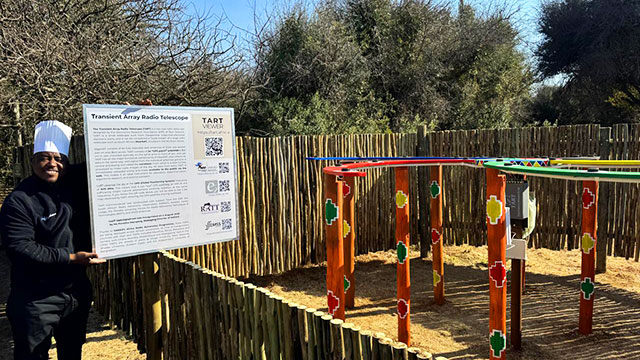
The recent installation and official launch of another Transient Array Radio Telescope (TART) proved to be a highlight event at the recent 13th Annual Science Unlimited Expo in Hammanskraal, Gauteng.
The Expo took place at the picturesque Kwalata Game Lodge, nestled within the Dinokeng Game Reserve. The TART launch marked a significant step forward in both scientific research and community engagement, drawing considerable attention from various stakeholders.
The launch ceremony itself was a well-attended affair, bringing together key individuals and groups instrumental in the TART project and broader scientific community. Distinguished attendees included dedicated members of the TART team, under the leadership of Rhodes University’s Distinguished Professor Oleg Smirnov, who have meticulously worked on the development and deployment of this innovative technology.
They were joined by representatives from the SARAO Executive Committee and other SARAO team members, underscoring the organisation’s commitment to advancing radio astronomy in the region, with SARAO Managing Director, Pontsho Maruping, officially cutting the ribbon at the launch. Special guests included Dr Bernie Fanaroff, the now-retired former SKA Project Director and former Special Advisor to the SARAO Managing Director, while the event also welcomed community members and honoured guests, alongside vital participants from the Kwalata Community Development Initiative, highlighting the collaborative and inclusive nature of this scientific endeavour.
The TART itself is a state-of-the-art instrument, a 24-element synthesis array radio-telescope designed to use entirely commercial off-the-shelf components. It continuously observes the entire sky in the GPS band. Besides providing satellite tracking capabilities, it also has science goals that lie in the detection of transient events - fleeting cosmic phenomena that provide crucial insights into the Universe. Beyond its observational capabilities, the telescope provides a versatile platform for hands-on training of students, as well as the development and refinement of new imaging algorithms, pushing the boundaries of radio astronomy data processing.
This low-cost, yet highly innovative telescope design was originally produced via the pioneering work of Dr Tim Molteno’s research group at the University of Otago in New Zealand. This technology was introduced to South Africa through a collaborative effort, bringing together the expertise of the University of Otago, Rhodes University, and Stellenbosch University.
The current deployment at Kwalata Game Lodge is an integral part of a much broader initiative. This extensive project is generously supported by SARAO and also receives invaluable support from the Development in Africa with Radio Astronomy (DARA) programme. The overarching aim of this initiative is to strategically establish a network of TART telescopes in various African partner countries, fostering scientific collaboration and capacity building across the continent.
The TART launch has been widely lauded as a monumental giant leap for astro-tourism and science, technology, engineering, and mathematics education, not only within the Hammanskraal area but extending its impact far beyond. This significant event served as one of the inaugural attractions of the Science Unlimited Expo, which stands as a cornerstone event in the realm of science education outreach.
The Expo itself is steadfastly dedicated to igniting curiosity, actively promoting, and significantly expanding environmental awareness among young people from across the entire region. Over the years, the Expo has blossomed into a leading educational platform, renowned for providing an exceptionally inclusive and engaging environment. Here, learners have the unparalleled opportunity to interact directly with leading experts in various scientific fields, discover exciting and cutting-edge developments in science and technology, and thoroughly explore a myriad of potential career pathways, inspiring the next generation of innovators and scientists.
